If you love cars, you might have heard a thump or knock when you press the gas. This sound can worry you, as it might mean something’s wrong with your car. Thumping noises can come from many things, like wheels that aren’t straight, worn-out parts, or problems with the transmission or starter motor mounts.
It’s important to find out why your car is making these noises and fix it fast. This keeps your car running well and makes driving smooth and comfy. In this article, we’ll look at why cars thump, how to figure out what’s wrong, and how to keep your car in top shape.
Key Takeaways:
- Thumping noises during acceleration can signal issues with the vehicle’s suspension, transmission, or engine mounts.
- Worn or damaged components, such as control arm bushings, transmission mounts, or exhaust hangers, can contribute to thumping sounds.
- Prompt diagnosis and repair of thumping issues can help prevent further damage and maintain the overall performance and safety of your vehicle.
- Regular inspections and preventative maintenance are essential to identifying and addressing potential problems before they become more serious.
- Consulting a qualified mechanic is recommended for accurate diagnosis and effective repair of thumping-related issues.
Understanding Car Thumping Noises
Thumping noises in your car can be a worry. They might happen when you speed up, slow down, or drive normally. These sounds often mean there’s a mechanical problem. Knowing what causes these noises is the first step to fixing them.
What Causes Thumping Noises?
Thumping sounds can come from several places. It could be the suspension, transmission, or drive shaft. If your suspension parts are worn or damaged, you might hear thumping on bumpy roads. Problems with the transmission, like worn gears or bad mounts, can also cause thumping during shifts or when you accelerate.
Common Types of Thumping Sounds
- Tire-related thumping: Unbalanced or misaligned tires can cause a distinct thumping noise, specially when driving at higher speeds.
- Suspension-related thumping: Worn shocks, struts, or control arms can result in a more pronounced thumping sensation as the vehicle navigates bumps or potholes.
- Transmission-related thumping: Issues with the transmission, such as worn gears or faulty mounts, can produce a noticeable thumping during gear changes or acceleration.
- Drive shaft-related thumping: Damage or imbalance in the drive shaft can lead to a thumping or vibrating noise, often more pronounced at higher speeds.
Understanding the type and timing of the thumping noise can help find the problem. Regular checks and maintenance can prevent these issues and make your ride smoother.
“Listening closely to the thumping noise and paying attention to when it occurs can be extremely helpful in pinpointing the source of the issue.”
| Cause | Symptom | Potential Solution |
|---|---|---|
| Worn Suspension Components | Thumping during driving, specially over bumps | Replace shocks, struts, or control arms |
| Damaged Transmission Mounts | Thumping during acceleration or gear changes | Replace transmission mounts |
| Unbalanced or Misaligned Tires | Thumping at higher speeds | Balance or align tires |
| Driveshaft Vibrations | Thumping or vibrating noise, specially at higher speeds | Inspect and repair driveshaft components |
Potential Mechanical Issues
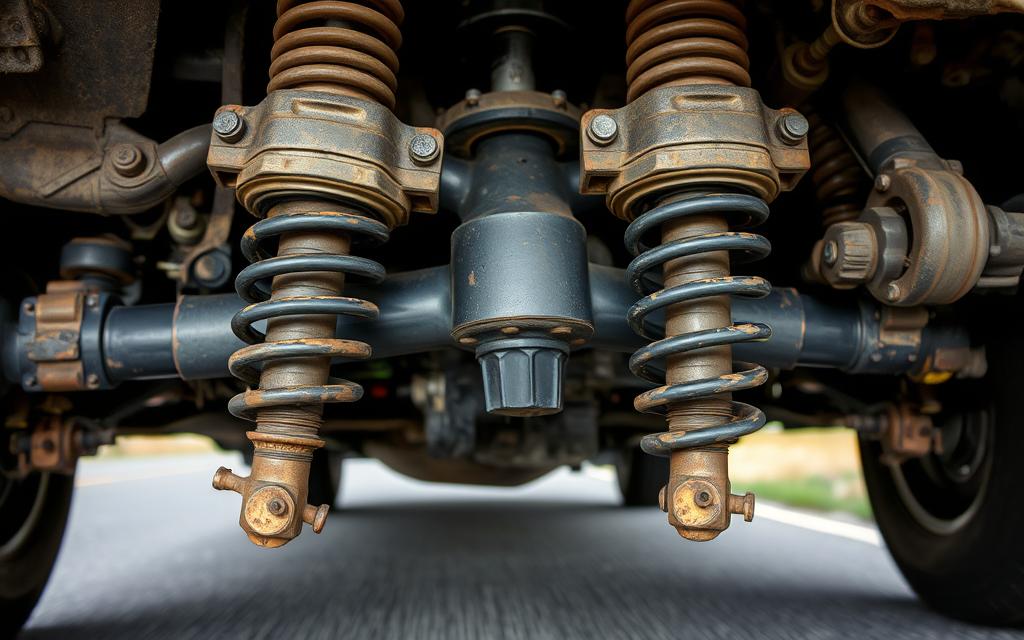
When your car thumps while accelerating, it might be due to several mechanical parts. Worn suspension parts, damaged engine mounts, and exhaust system problems are common culprits. These issues can cause the annoying thumping noise you hear.
Worn Suspension Components
Worn suspension parts are a common cause of thumping noises. Over time, parts like bushings and ball joints wear out. This leads to excessive movement and a thumping or knocking sound, often from the front.
Damaged Engine Mounts
Engine mounts keep the engine in place. When they’re damaged or worn, the engine moves more than it should. This movement creates a thumping or banging noise, noticeable when you press the gas pedal.
Exhaust System Problems
Problems with the exhaust system can also cause thumping noises. A loose or damaged exhaust pipe or muffler can vibrate and make unusual sounds. This includes thumping or rattling noises.
Fixing these mechanical issues is key to a smooth ride. Regular checks and maintenance can catch problems early. This ensures your car runs smoothly and quietly.
| Mechanical Issue | Symptoms | Potential Causes | Estimated Repair Cost |
|---|---|---|---|
| Worn Suspension Components | Thumping, knocking, or clunking noises, often from the front | Worn bushings, ball joints, or other parts | $94.99 – $114.99 for a full inspection and diagnosis |
| Damaged Engine Mounts | Thumping or banging noise during acceleration, engine movement or vibration | Broken or worn engine mounts | $200 – $500 to replace engine mounts |
| Exhaust System Problems | Thumping, rattling, or vibrating noises from the exhaust | Loose or damaged exhaust pipe, muffler, or components | $100 – $300 to repair or replace exhaust parts |
Transmission Problems
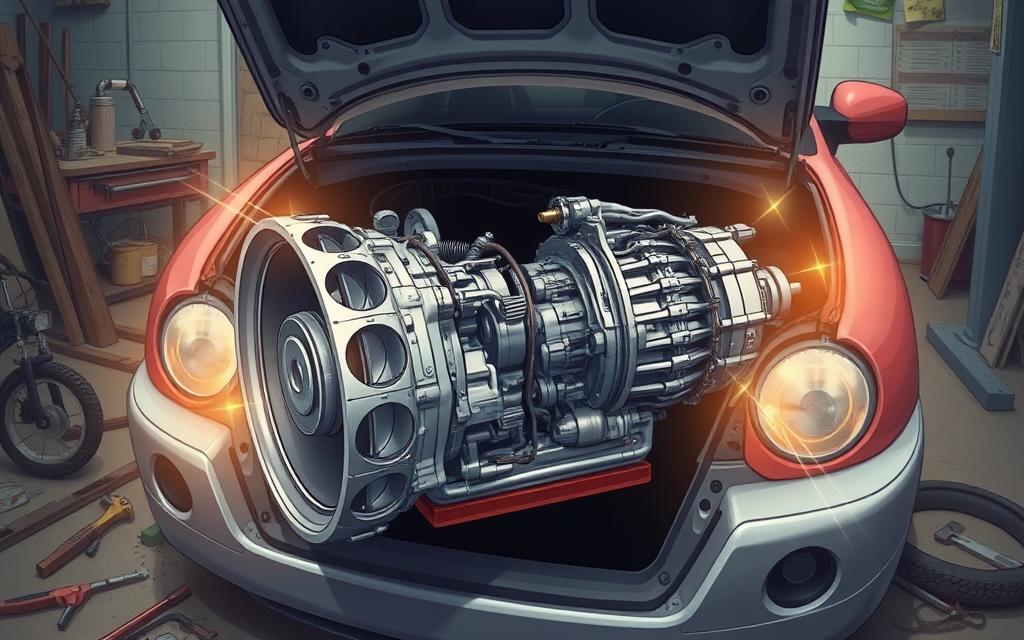
Transmission issues can cause thumping noises in your car, often during acceleration or gear shifts. This problem affects both manual and automatic transmissions differently.
Signs of Transmission Trouble
In manual transmissions, thumping sounds are more noticeable when shifting gears. Automatic transmissions might thump during gear changes. Remember, smooth operation in neutral or reverse doesn’t mean there are no problems. Issues might only show up when the car is under load.
Thumping Related to Gear Shifts
Thumping noises can come from worn or damaged transmission parts like clutches, gears, or synchronizers. These problems are more common during acceleration, when the transmission is under stress. Regular maintenance and repairs are key to avoiding these issues.
| Repair Type | Average Cost |
|---|---|
| Transmission Fluid Change | $100 – $200 |
| Transmission Rebuild | $1,500 – $3,000 |
| Transmission Replacement | $2,000 – $4,000 |
Don’t ignore thumping noises from your car’s transmission. They could signal a bigger problem. Getting a quick diagnosis and repair from a skilled mechanic can save you money and ensure a smooth ride.
Tire Conditions
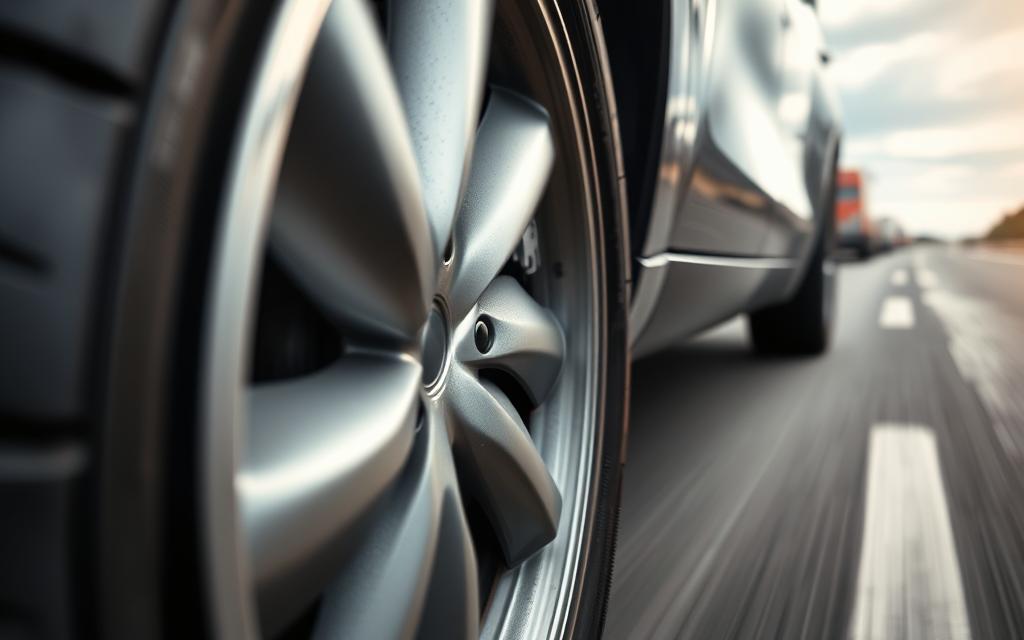
Tire problems can cause thumping noises while driving. Worn, unbalanced, or misaligned tires are common culprits. Look for cracks, uneven wear, or bulges on your tires.
Unbalanced or Misaligned Tires
Tires out of balance or misaligned make a thumping sound when you speed up. This happens when tires don’t rotate evenly. Regular rotations and alignments can fix this.
Impact from Road Hazards
Potholes, curbs, or other road hazards can damage tires, causing thumping. Tread separation or flat spots can lead to vibrations. If you hit something, get your tires checked by a pro.
| Service | Average Cost |
|---|---|
| Tire Fitting | £55.88 |
| Suspension Repair | £135.27 |
| Starter Motor Repair | £384.39 |
| Brake Repair | £134.35 |
Fixing tire imbalance or wheel bearing failure makes driving smooth again. Don’t ignore thumping noises. They might mean bigger problems. Get a mechanic to check your tires.
“Thumping noise and rotational feeling in gas pedal reported after installing new CTC Motomaster All-Season SE tires on a 99 Taurus.”
Engine Performance Issues
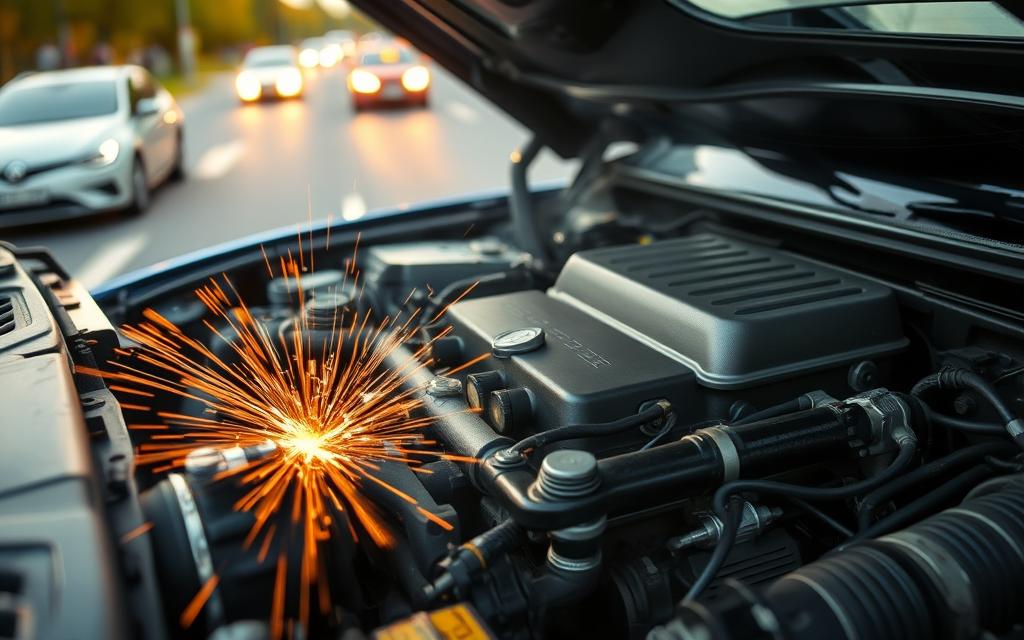
Thumping noises during acceleration often point to engine problems. Fuel delivery issues and ignition system malfunctions are common causes. These problems can cause knocking or thumping sounds, more noticeable when accelerating.
Problems with Fuel Delivery
Fuel system problems, like a bad fuel pump or clogged injectors, can disrupt the air-fuel mix. This leads to engine knocking or acceleration noise as the engine struggles. Regular checks of the fuel system are key to avoiding these issues.
Ignition System Malfunctions
Ignition system issues, like worn spark plugs or faulty coils, can also cause problems. When the ignition system fails to time the spark right, it can lead to engine knocking and other noises, mainly during acceleration. Fixing these problems can help your engine run smoothly again.
“Proper maintenance and timely repairs of the fuel and ignition systems are crucial to prevent engine performance issues and the associated thumping noises during acceleration.”
Fixing engine performance problems can solve thumping sounds and ensure your car runs well. Regular checks and maintenance are essential for engine health and avoiding expensive repairs later.
Diagnosing the Thumping Road Noise
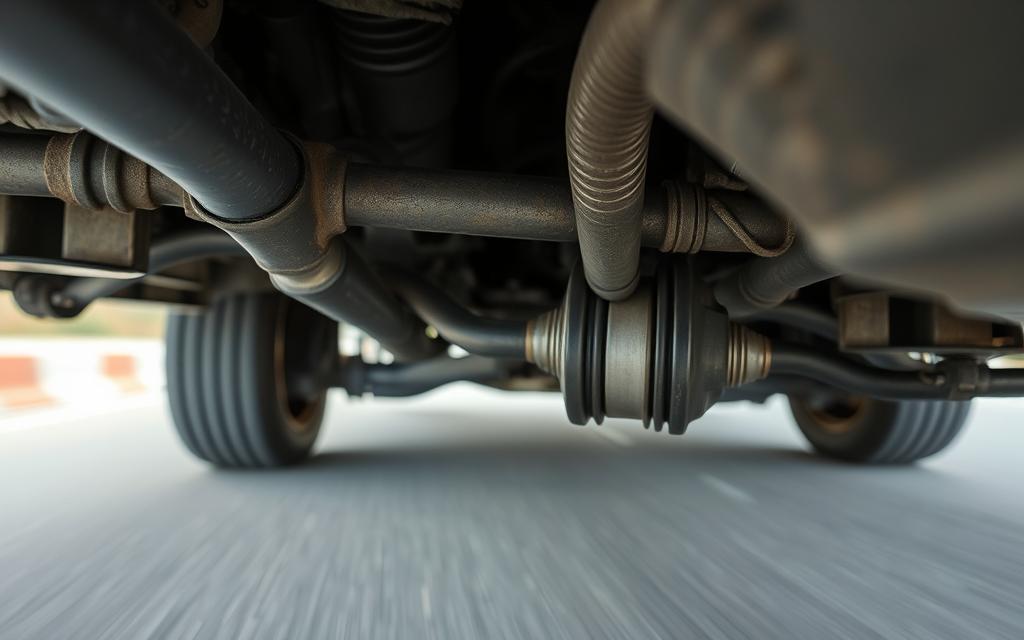
Finding out why your car thumps can be tough. But, with the right steps, you can solve it. The key is to listen carefully and observe well.
Listening Techniques for Diagnosis
Start by noticing when and where the thumping happens. Is it when you’re speeding up or when you’re going slower? If it’s more when you’re moving fast, it might be your wheels or tires.
Also, listen to how the thumping changes as you speed up or slow down. Does it get louder at certain speeds? This can help you figure out what’s wrong. Plus, see if the thumping is worse on smooth or rough roads. This info can help narrow down the problem.
When to Seek Professional Help
While you can try to fix it yourself, sometimes you need a pro. If you can’t find the problem after trying, get a mechanic’s help. They have the tools and know-how to fix it right.
Don’t ignore the thumping noise. It can cause more damage and cost more to fix later. By using your own observations and getting help from a mechanic, you can fix the problem and enjoy a quiet ride.
Driving Conditions Impacting Noise
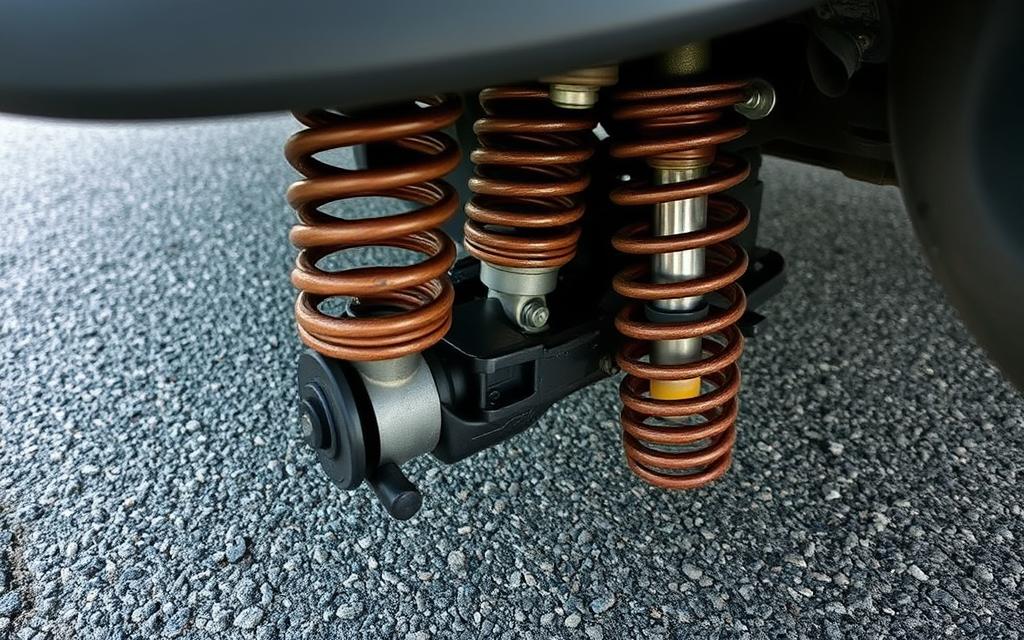
The conditions you drive in can really affect the thumping sounds from your car. Things like the road and weather play big roles. They can make problems with your suspension or acceleration noise worse.
Road Surface Effects
Driving on rough roads can make suspension problems worse. Potholes and cracks can make your car’s suspension work too hard. This leads to more thumping or knocking sounds.
This is more likely if your shocks, struts, or other parts are already worn or damaged.
Weather Conditions Influence
Bad weather can also affect your car’s suspension and cause thumping noises. Sudden temperature changes can affect tire pressure. This makes your suspension work less well.
This can cause a thumping feeling when you accelerate or hit bumps.
Driving in wet or icy conditions puts more strain on your suspension. This can make existing problems worse and make thumping sounds more noticeable.
“Proper maintenance of your vehicle’s suspension and tires can help mitigate the impact of driving conditions on thumping noises.”
Knowing the road and weather conditions in your area can help. It prepares your car for these challenges. This way, you can reduce unwanted thumping sounds while driving.
Preventative Maintenance Tips
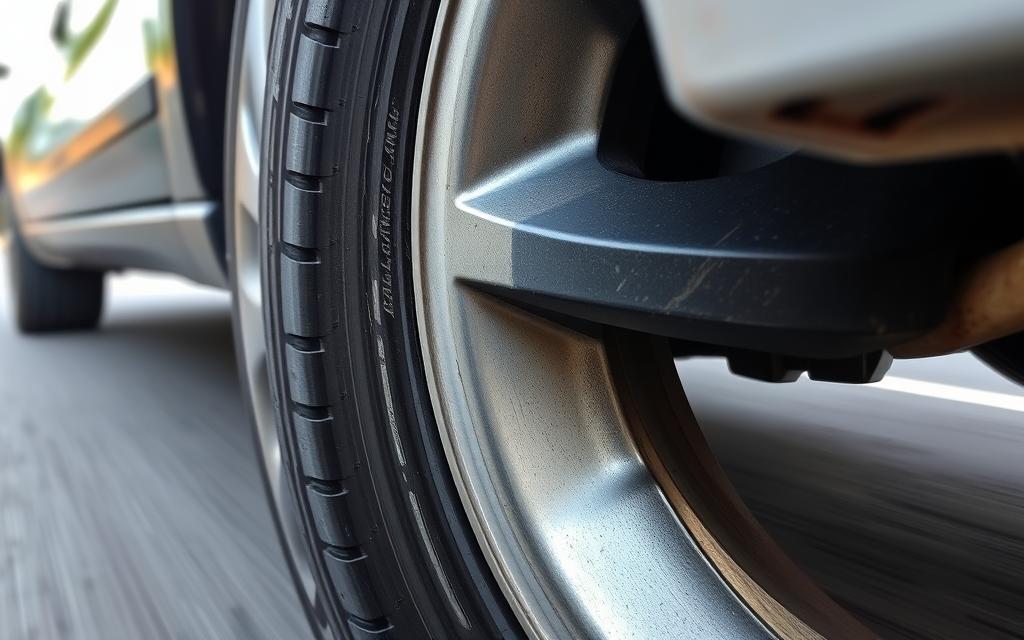
Keeping your car in good shape can stop thumping noises when you accelerate. Regular checks and well-maintained tires are key for a smooth ride.
Regular Inspections
Check your car’s suspension parts often to catch wear or looseness. Look at the shocks, struts, and ball joints for damage. Also, check your wheel bearings to make sure they’re working right and not causing the thumping.
Keeping Tires in Good Condition
- Make sure your tires are the right pressure – Low or uneven tires can cause tire imbalance and thumping.
- Rotate your tires often – It helps them wear evenly and prevents wheel bearing failure.
- Change old tires – Worn tires are more likely to hit road hazards, damaging your wheels and suspension.
Also, keep your engine and transmission mounts in good shape. This can stop thumping noises when you speed up.
| Maintenance Item | Recommended Interval | Estimated Cost |
|---|---|---|
| Tire Rotation | Every 5,000-7,500 miles | $20 – $50 |
| Wheel Alignment | Every 12 months or 12,000 miles | $50 – $100 |
| Engine/Trans Mount Inspection | Every 30,000 miles | $100 – $300 |
By doing regular checks and keeping your tires and suspension in check, you can avoid thumping sounds. This makes your car ride smoother and more comfortable.
Common Myths about Car Noises
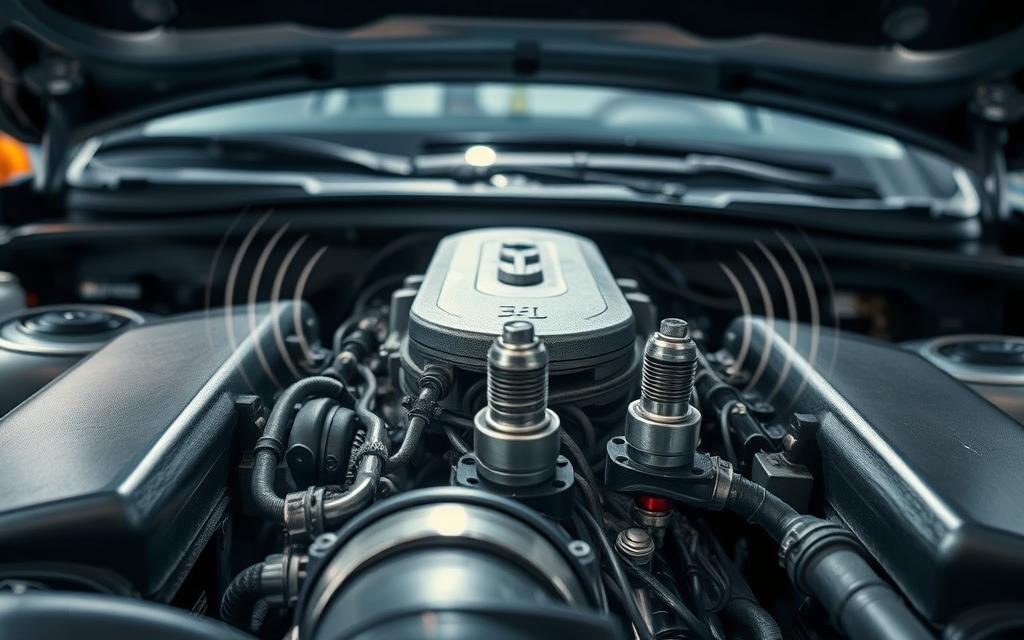
Many people worry about car noises without knowing the truth. They think all thumping sounds mean big problems. But, often, these noises come from simple issues like worn-out parts or loose exhaust systems.
Another myth is that any engine noise means disaster. While unusual sounds can be a sign of trouble, not all are serious. For example, a mild engine knocking might just be normal.
Transmission sounds are also often misunderstood. Transmission issues can cause thumping or grinding. But, these sounds can also come from other problems, like a bad torque converter.
“It’s important to diagnose the specific cause of a car noise rather than jumping to conclusions about the severity of the problem.”
To deal with car noises, it’s crucial to get to the root of the problem. Knowing what different sounds mean can help avoid unnecessary worry. This way, car owners can make smart choices about what to do next.
Misconceptions Regarding Thumping
- Not all thumping sounds indicate major engine or transmission problems.
- Thumping can be caused by less severe issues like worn suspension components or unbalanced tires.
- Loose exhaust systems can also produce thumping noises.
Clarifying Engine Noise Fables
- Unusual engine sounds don’t always signify impending disaster.
- Mild engine knocking may be within normal operating parameters and not require immediate attention.
- Transmission-related sounds can be caused by issues with other vehicle systems, such as a malfunctioning torque converter or worn-out clutch components.
Understanding car sounds and their causes helps avoid unnecessary worry. This knowledge allows car owners to make informed decisions about their vehicles.
The Role of Vehicle Age
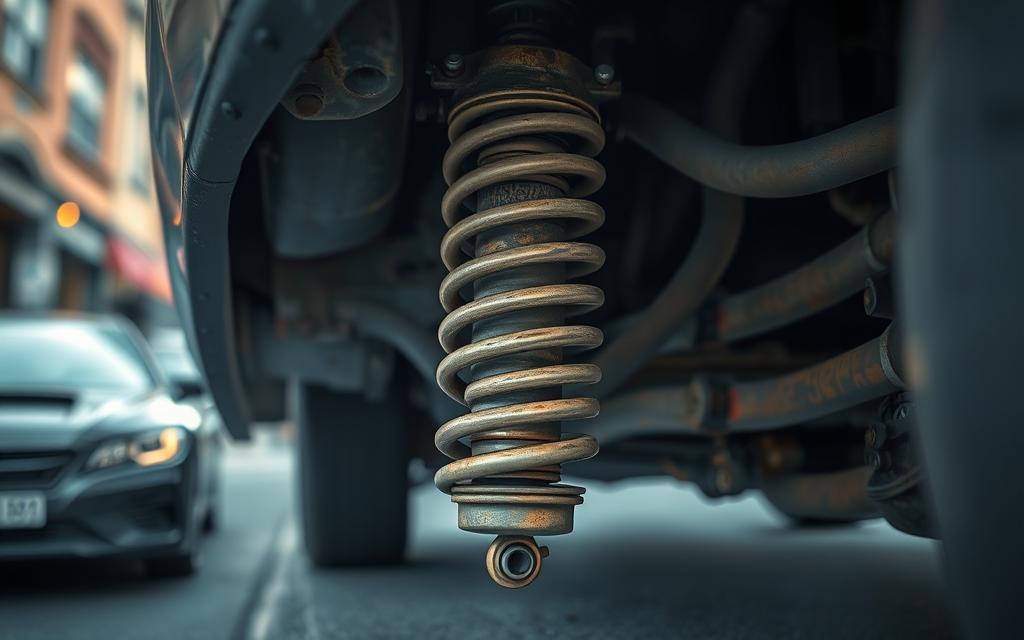
The age of your car can affect why it thumps when you accelerate. As cars get older, parts like suspension and engine mounts wear out. This makes thumping noises more likely.
How Aging Affects Performance
Parts like ball joints and bushings in the suspension can wear down over time. This leads to a thumping sound when you speed up. Engine mounts also wear out, adding to the thumping.
Experts say engine mounts should last 5-7 years, depending on how you drive. Keeping an eye on these parts helps avoid thumping sounds.
Older Models vs. Newer Models
Newer cars might have better parts, but they still wear out. Even the best parts can wear down over time. But, newer cars are less likely to have suspension thumping because of better technology.
It’s key to fix thumping noises quickly to avoid more damage. Regular checks can catch problems early and keep your car safe and comfortable.
The Importance of Prompt Repairs
Don’t ignore thumping noises in your car. They can mean serious problems. Fixing them quickly is key to avoid bigger issues. Ignoring these sounds can damage your car’s parts, affect how it handles, and even cause accidents.
Risks of Ignoring Thumping Noises
Ignoring thumping noises can lead to big problems. These sounds often mean issues with your suspension system, engine mounts, or transmission. If you don’t fix these, you’ll face more acceleration noise and transmission issues, costing you a lot later on.
- Worn suspension parts can make your car unstable and hard to control, risking accidents.
- Bad engine mounts let the engine move too much, damaging other parts and causing more vibrations.
- Transmission problems get worse if not fixed, leading to slipping gears, slow shifting, or even a broken transmission.
Estimated Repair Costs for Common Issues
Fixing thumping noise problems can cost a lot, but it’s cheaper to do it fast. Here are some repair costs for common issues:
| Repair | Average Cost |
|---|---|
| Tire Fitting | $55.88 |
| Suspension Repairs | $135.27 |
| Starter Motor Repairs | $384.39 |
| Brake Repairs | $134.35 |
The real cost can change based on the problem, how bad it is, and your car’s make and model. Fixing thumping noises quickly can save you money and keep your car safe and running well.
Stray Noises vs. Thumping Sounds
It’s important to know the difference between various car noises. Thumping sounds might mean there’s a mechanical problem. But, other noises can come from different parts of the car. Knowing what these sounds mean can help you find and fix the issue.
Differentiating Engine Noises
Car noises often come from the engine. Engine knocking might mean spark plugs or fuel system issues. On the other hand, drive shaft vibrations could point to worn-out parts or imbalance.
Thumping sounds usually mean problems with the suspension or tires. These sounds get louder when you accelerate or turn. Knowing when and how the thumping sounds happen can help figure out what’s wrong.
Identifying Structural Issues
Structural problems in the car can also cause noises. These might include issues with the chassis or frame. Unlike engine noises, structural problems often make a sound that keeps going and doesn’t change much.
Listening carefully to the car’s sounds can help you tell if it’s an engine or structural problem. If you’re not sure, it’s best to get help from a mechanic.
How to Ensure a Smooth Ride
Keeping your vehicle ride smooth is very important, more so if you hear thumping noises when you accelerate. By changing how you drive and following some tips, you can make your car’s suspension last longer. This also helps in avoiding those annoying thumping sounds.
Adjusting Driving Habits
Being careful with your driving habits is crucial for a smooth ride. Try not to speed up or brake hard, as it can harm your suspension. When you need to accelerate, do it slowly and smoothly. When braking, apply the brakes gently and evenly. Also, slow down for rough roads to protect your suspension.
Recommended Driving Techniques
- Drive at a steady, moderate speed, mainly on highways and open roads. Quick speed changes can worsen suspension problems.
- Think ahead and plan your moves. This helps you adjust your speed and style to fit any road conditions or obstacles.
- Don’t make sharp turns, as they can stress your suspension. Instead, make turns slowly and smoothly.
- Slow down and pass over potholes or road hazards gently to lessen the impact on your suspension.
By following these driving tips, you can reduce stress on your vehicle’s suspension. This helps avoid those annoying thumping noises when you accelerate. Remember, a well-kept suspension is essential for a smooth, safe, and comfortable ride.
The Benefits of Consulting a Mechanic
When you notice thumping or unusual noises in your car, a mechanic can help a lot. They have the skills and tools to find out what’s causing the problem. This can save you from bigger issues down the road.
Finding a Reputable Mechanic
Choosing the right mechanic is key. Make sure they know your car’s make and model well. Look for someone with a good reputation for fixing cars right.
Ask people you trust or check online for good mechanic recommendations. This way, you’ll find someone reliable and trustworthy.
Questions to Ask Your Mechanic
When you find a good mechanic, ask them lots of questions. Ask how they plan to fix the problem and what it will cost. Also, ask how long it will take.
A good mechanic will explain everything clearly. They want you to feel sure about the repairs. This way, you can drive your car without worry.
Getting help from a mechanic can really help. They can figure out what’s wrong and fix it right. This keeps your car running well for a long time.
“A good mechanic will take the time to ensure you understand the issue and feel confident in the repair plan.”
Understanding Vehicle Specifications
Following the manufacturer’s guidelines is key to keeping your vehicle in top shape. It helps prevent annoying noises like acceleration noise or engine knocking. By sticking to your owner’s manual, you can keep your car running smoothly and avoid expensive repairs.
Manufacturer Guidelines
Every car maker gives detailed advice on maintenance and parts. These tips come from lots of research and tests. They help your car run well and last longer. It’s important to use the right oil and fuel, and follow the recommended maintenance schedule.
Importance of Following Specifications
Ignoring these guidelines can cause big problems. The wrong oil or fuel can lead to engine knocking or wear out parts faster. Not replacing spark plugs when needed can also hurt your car’s performance and gas mileage.
Following the manufacturer’s advice helps avoid annoying noises. It ensures your vehicle runs smoothly for many years.
“Proper maintenance and adherence to manufacturer guidelines is the key to keeping your vehicle running its best and avoiding costly problems down the road.”
Conclusion: Ensuring Your Vehicle’s Longevity
Keeping your vehicle in good shape is crucial for a smooth ride. If you notice thumping noises when you accelerate, or if you have transmission or suspension issues, act fast. This helps avoid bigger problems and keeps your car running well.
Summarizing Key Points
We’ve looked at why your car might thump during acceleration. It could be worn-out suspension parts, damaged engine mounts, or problems with the transmission or fuel system. Knowing the causes and spotting early signs lets you fix issues before they get worse.
Final Thoughts on Car Maintenance
Regular checks and following the manufacturer’s advice are key to keeping your car in top shape. Using quality parts, like those from GSP, also helps. By being quick to address any odd noises or performance issues, you’ll have a safer and more enjoyable drive for many years.
FAQ
What causes thumping noises when accelerating my car?
What are the common types of thumping sounds in a car?
How can suspension problems lead to thumping noises?
What role do engine and transmission mounts play in thumping noises?
How can transmission issues contribute to thumping sounds?
What tire conditions can cause thumping noises?
How can engine performance issues lead to thumping noises?
How can I diagnose the cause of thumping noises in my car?
How can driving conditions impact thumping noises?
What preventative maintenance can help avoid thumping noises?

Jack Thompson is a writer and seasoned auto mechanic with over 15 years of experience in the automotive industry. Known for his expertise in vehicle mechanics, Jack has a deep understanding of car and truck systems. His skills, honed through years of hands-on experience, have made him a trusted name in the field. Jack is committed to providing valuable insights into car maintenance and repair, helping vehicle owners keep their vehicles in top condition.

